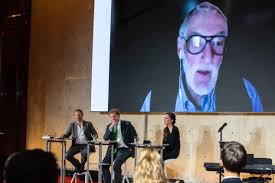DEPOPULATION GAMES: GATES, JOHNSON, DEAGLE, MEADOWS

We know now, beyond any doubt: that was democide. Is.
I thought so from the beginning. I’d read Bill Joy’s article Why the Future Doesn’t Need Us way back in 2008, and from there the Unabomber’s The Future of Industrial Society, and I’d checked out the Deagel.com population forecasts and knew about the Georgia Guidestones. I’d read the Club of Rome’s 1991 publication, the First Global Revolution, with its infamous passage concluding “The real enemy then is humanity itself.” With the known eugenicist Bill Gates announcing that ‘we’ would have to vaccinate the entire population of the planet, you didn’t need to be a genius to have some idea of what was going on — though you would have to be a genius to figure out how to alert your brainwashed family members to the danger they were in. And of course they don’t want to know now, even though there are things they could be doing to detox themselves. And so we go on, pretending it didn’t happen and isn’t happening, in this weird, depressing, unreal fashion like a chemtrail day without shadows… but it did, and if it did, then the event over-arches our entire adult lives; we just didn’t know it.
At some point in 2020 or 2021 a clip was doing the rounds from an interview with Stanley Johnson, former EU Commissioner and father of the then Prime Minister of the UK, in which he postulated that the ideal population for the British Isles would be between 10 and 15 million people, and that this must happen by 2025 at the latest. That caught my attention because I remembered that the Deagel.com forecast for UK population in 2025 lay within that range. The coincidence strongly suggested shared but unstated premises. Another clip that resurfaced around then was an excerpt from an interview with Professor Dennis Meadows, lead author of The Limits To Growth, published by the Club of Rome in 1972 — the document which inaugurated the establishment environmentalist movement — in which he flatly states that ‘we are going to have a billion people’, though without giving any dates by which the global population will be reduced to that level.
Recently I went back and watched both full interviews, and it was interesting to view them side by side, as it were. Both take roughly the form of a career retrospective, highlighting the role of the subject in the formation, over the last half century, of the powerful establishment faux-environmentalist movement, operating through multilateral organisations and treaties which are being used to strangle Western economies and societies. Both men played important roles in the construction of the kill-box in which we find ourselves.
Both interviews have to be seen in the context of a strange and counterintuitive trend of disclosure, beginning in 2010 with Bill Gates’ ‘Innovating to Zero’ TED talk, in which he presented a formula for calculating carbon dioxide emissions:

Controversy focused on Gates’ assertion that vaccines, healthcare, reproductive health services, etc, could reduce population growth by up to 15%, and Reuters, USA Today and other fact-checking services expended much effort reassuring the public that Gates was not talking about killing people with vaccines, but referencing the widely accepted fact that reducing infant mortality tends to lead to an eventual decrease in birth rates, since parents grow more confident of their offspring surviving into adulthood. In fact what he is doing here is referencing a well-known argument in order to eliminate it. His own solution is much more radical:
“Probably one of these numbers is gonna have to get pretty close to zero.”
When he says this, laughter ripples through the audience. It’s a strange and somewhat shocking moment. The laughter seems to acknowledge a subliminal message: that the ‘zero’ of Gates’ title refers primarily to the first factor in the equation — People.
Was it an invited audience? I don’t know, but it probably had an invited contingent, and maybe it was some of these people who laughed and the reaction rippled out from there. Regardless, it shows that even by 2010 the idea had been accepted, if only subconsciously, by some sections of society.
And of course the issue of population was foundational to the environmentalist case: it was there from the beginning, before climate even figured in the debate — that issue was only pumped up in the late eighties and 1990’s, with the formation of the UN Intergovernmental Panel on Climate Change and the publication of The First Global Revolution and the 2nd edition of The Limits to Growth. Population is the #1 premise of establishment environmentalism — but has to remain unspoken, or can be spoken of only through equivocation, which is where carbon dioxide comes in. The meme ‘You are the carbon they want to reduce’ captures it exactly.
The eugenics/climate equivocation is illustrated very clearly in the 2012 Stanley Johnson interview, which became much more interesting in retrospect, once Johnson’s son ‘Boris’ had acceded to the position of Chief Clown in the Parliament of Fools in the immediate run-up to the inception of the Great Cull. Interest focused on the passage in which Johnson Snr expresses his opinion that the ideal population of Britain would be somewhere between 10 and 15 million — by 2025 ‘at a limit’. The equivalence of the climate crisis and the population issue doesn’t just characterise the interview but the entirety of Johnson’s career, to the extent that it becomes very obvious that the one is merely cover for the other in the mind of this orthodox functionary involved in building the legislative framework to impose the environmentalist/ depopulation agenda on the world.
Johnson’s experience of environmentalism as downstream of population concern forms the backbone of the interview, and of Johnson’s career. The interviewer, the Guardian’s long-serving environment editor John Vidal, throws him an invitation very early. Johnson seems strangely breathless in the early stages of his coming-out interview; his tension about peeling back the environmentalist mask to reveal the eugenicist skull beneath. Once Vidal has got him to broach the forbidden subject, he gradually becomes more comfortable and stops hyperventilating. By the end of the interview he is channeling, almost verbatim, the Club of Rome:
“In the end the problem is the human race itself, there’s no question about that.”
I’m not saying that Johnson has no feeling for the natural world or that his environmentalism is not sincere: he likes animals, wants to preserve the English countryside, and so on. But his career is a very clear illustration of the hierarchy of issues in establishment environmentalism. Having been employed by the World Bank in Washington DC in the sixties, Johnson set up the UN Fund for Population Activities in 1971 and “only came into environment on the back of that” (14:04 in the interview). And that is establishment environmentalism in a nutshell.
The passage that gave this interview its shock value comes towards the end, as Johnson grows more comfortable with his taboo-breaking assignment. Vidal asks him about the ‘carrying capacity’ of Britain, and it’s worth quoting Johnson’s answer in full because there’s a linguistic non-sequitur, a leap to a different linguistic register, which is of interest (from 22:36 in the interview).
“Well, Britain, I’d put it at 10 to 15 million,” (both Johnson and Vidal start laughing), “– um, I think that’d be absolutely fine, I mean that would do us really splendidly — at-at-at a limit, 2025.”
What caught my ear here is the contrast between the Old Etonian bluster of ‘absolutely fine’ and ‘that would do us splendidly’ and the cold bureaucratese of ‘at a limit’. It’s an odd slippage of diction, suggesting, again, an allusion to unstated premises, unreferenced agreements and policies. The coincidence with Edwin Deagle’s forecast for the UK, published two years later on his website Deagel.com, is highly noteworthy, I think; it seems clear to me that Deagle is singing from the same hymn-sheet. The fact that Deagle’s country-by-country forecasts amount to a decline of over a billion in world population makes me wonder whether that was the intended milestone to be reached by the inverted biowarfare of the COVID operation: a reduction in world population of approximately one billion people. Deagle is calculating the implications of such a decline on military spending. In his final (2020) Disclaimer, Deagle takes the COVID debacle as evidence for his collapse thesis, but clearly does not believe his projected ‘confluence of crises’ has yet materialised.
“After COVID we can draw two major conclusions:
The Western world success model has been built over societies with no resilience that can barely withstand any hardship, even a low intensity one. It was assumed but we got the full confirmation beyond any doubt.
The COVID crisis will be used to extend the life of this dying economic system through the so called Great Reset.“
This third Disclaimer contrasts with the previous two in its length and relative freedom of expression, and by actually making sense; it’s as if he has been let off the leash by the materialisation of the crisis he knew to expect but couldn’t name, and can now speak more freely. I do think it is likely that the forecasts are Deagle’s extrapolations based on premises he cannot reveal, and I think it’s perfectly obvious what those premises were.
Professor Dennis Meadows is a much bigger wheel than Stanley Johnson in the history of the establishment environmental movement. While technically a co-author of the 1972 The Limits to Growth report, he was clearly the driving force behind it. In fact Limits to Growth grew out of Meadows’ two year directorship of the ‘Club of Rome Project on the Predicament of Mankind’ at MIT (1970 to 1972).

Like Johnson, Meadows shows a certain tension in broaching the topic of depopulation. His confession comes towards the end of the interview, hosted by the Club of Rome’s Dutch Association, and he prefaces it with an acknowledgement that ‘since you are able to edit out all the stuff you don’t like, I can speak honestly.’ But he’s not quite honest; as with Johnson, he obfuscates: he talks about population ‘coming back down’; about this reduction ‘occurring’, as if these might be spontaneous developments. He talks about volcanoes and pandemics as possible natural triggers for what he regards as inevitable collapse. But eventually he gets the courage to let the equivocal mask slip, and his language coyly acknowledges human agency and a decision already reached.
“We are so far above the population and the consumption levels which can be supported by this planet, that I know that one way or another it’s going to come back down, so I don’t hope to avoid that. I hope that it can occur in a… a civil way, and I mean civil in a special way: peaceful. Peace doesn’t mean that everybody’s happy, but it means that conflict isn’t solved through violence, through force, but rather in other ways, so that’s what I hope for. The planet can support something like a billion people, maybe two billion, depending on how much liberty and how much material consumption he want to have. If you want more liberty and more consumption, you need fewer people, and conversely if you have more people – I mean, we could even have probably eight or nine billion if we have a very strong dictatorship which is smart; unfortunately we never have smart dictatorships, they are always stupid, but if we had a smart dictatorship and a low standard of living … but we want to have freedom and we want to have a high standard of living, so we’re going to have a billion people. And we’re now at seven, and we have to get back down. I hope that this can be slow, relatively slow, and that it can be done in a way that is relatively equal, you know, so that people share the experience, and we don’t have a few rich forcing everybody else to deal with it. These are my hopes, and they’re pretty pessimistic hopes, but that’s what lies ahead.” (From Part IV of the interview.)
Meadows must know that it’s happening; phase 1 of the operation, at least. I imagine he must be moderately pleased by the ‘civility’ being shown by the submissive masses as the epidemic of heart attacks, strokes and cancer rolls on; the ‘gruesome quiet‘, to borrow a phrase from Hannah Arendt, which surrounds the continuing cull. As for ‘sharing the experience’ — what a bizarre choice of words! — a fifteen-year-old boy in this Thai village died from cardiac failure last week, while a royal princess still lies in a coma, so I suppose there is some degree of ‘equality’ in the distribution of sudden death (leaving aside the exempted politicians, of course, and the pharma CEOs and directors of international health organisations who decided selflessly to forego their dose so that someone else could benefit).
But for myself, that phrase evokes only a bitter laugh, since there is not one member of my blood family with whom I can ‘share the experience’ of living through this unprecedented period in human history, not one whom I was able to successfully alert to the danger, not one with whom I can discuss any of this to this day.
Perhaps Meadows thinks that tricking people into allowing themselves to be injected with substances designed to kill, maim and sterilise is not violence: that it’s a ‘peaceful’ way of dealing with the problem. But the subtle nervousness betrayed by both Johnson and Meadows tells me that both men have some sense of the deep moral abyss inherent in the cause they are espousing, regardless of karmic sleight-of-hand: that mass-murder is mass-murder, even if you deceive or bully people into taking the poison voluntarily. Both no doubt believe that the science justifies the necessity of the operation. Johnson, however, is no scientist, and Meadows, though he is described as a ‘scientist’ by both the Club of Rome and Wikipedia, has a background in social science and systems management. No one who declares carbon dioxide to be a ‘pollutant’ can lay claim to a scientific outlook.
I think people are gradually becoming aware that population phobia is as hollow as the climate hysteria. We hit the peak in rate of population growth way back in 1968 — the same year, ironically, that Paul Ehrlich published The Population Bomb. Live births, worldwide, have been declining since 2012, when 146 million babies were born. In 2021, 54% of countries had fertility rates below the replacement level of 2.1 children per woman, according to Reuters — and that includes India. This decline has not yet shown up in population totals, since the death rate is also falling. But it will.
In a few decades, we will be close to a peak in population (the UN projection is for 2084, peaking at around 10 billion). The expectation is that from that point, population will enter a continuous decline. The sane, rational, civilised policy, then, would be to allow matters to take their course, while doing everything we can to support biodiversity and shield the natural world from corporate depradation.
Population concern, then, is as much a profasis for mass murder as climate change. The underlying motive is as old as oligarchy itself: fear and hatred of the common people, and a desire to get rid of them at the earliest possible opportunity; that is, as soon as they are no longer needed to supply the needs of the oligarchy. And that moment is now: as robotics and artificial intelligence take over all human roles, the economic value of the human being falls to less than zero. It’s not about saving the planet — it’s about preserving for all time the dominant position of the oligarchy.
The ‘civility’ Meadows hopes for applies only to the targeted, not the perpetrators. He searches for another word and comes up with ‘peaceful’. But what he actually means is ‘pacification’: he hopes the masses can be kept passive during the process of their elimination. And it occurs to me that this can be achieved only through the creation of systems of distraction just as sophisticated as the system of elimination. Meadows has spent much time in his retirement devising ‘strategic games’ to educate students about sustainable development. But — and here’s an unsettling thought — if the depopulation agenda has been in place since the nineteen seventies, then the whole of social media has arisen under its shadow, providing us all with strategic games to play — ‘a simple crutch to occupy the mind’, to paraphrase Michael Stipe. Game Theory meets Theatre of the Absurd. And so we pass the time like Vladimir and Estragon, bickering about what’s real and scoring points off each other, until it’s our turn to shuffle out of the oligarchs’ way and vacate the planet to their pleasures. Is that all we’re doing, even here?
Just a thought. I’ll take it as a reminder not to spend too much time online. I’m growing food; I helped create this farm in 2019, and it’s almost impossible to break even, but the barn is stacked with rice, the fields are positively bursting with bananas, and my ponds are full of fish. I’d better get back to work — it’s good being outside, under the sun, taking the strain to achieve something real. It’s in my nature to be civil, but I will not be pacified, will not participate in the lie, will not pretend it’s not happening, and I trust, friend, that neither will you.